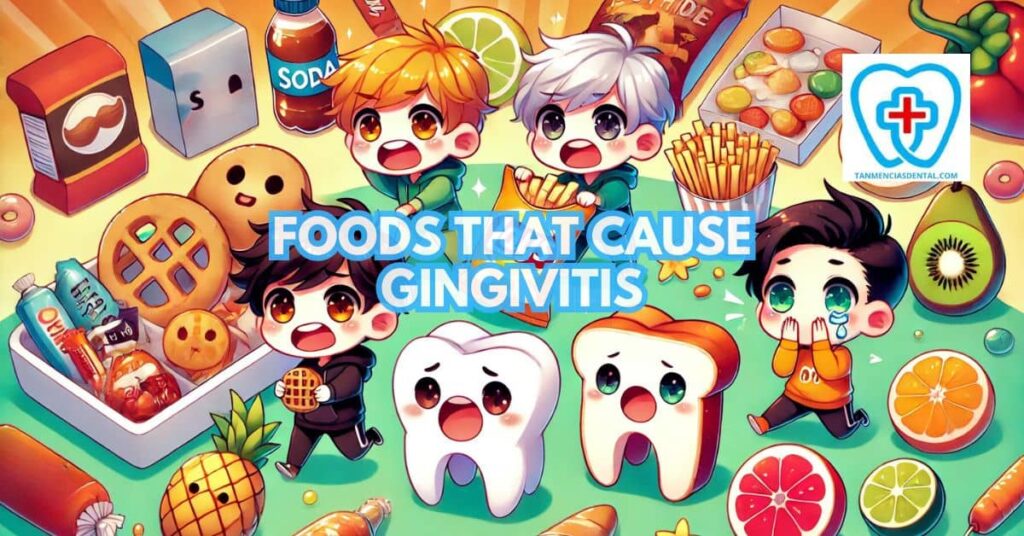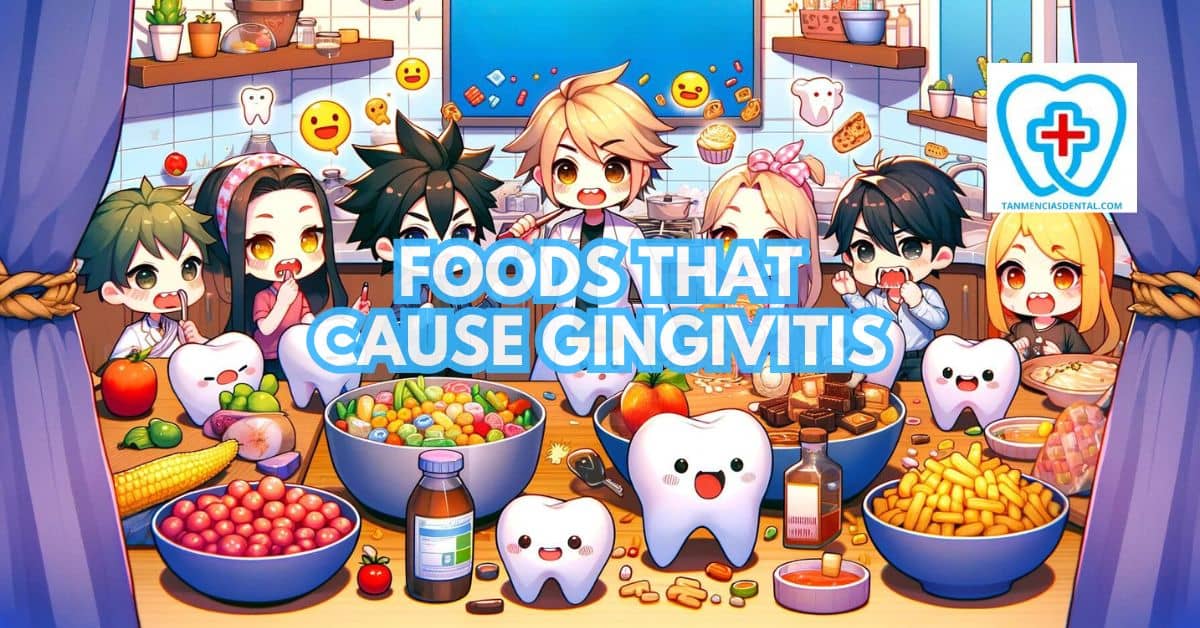Gingivitis, an early stage of gum disease, is often triggered by the foods we eat.
Certain foods that cause gingivitis promote the growth of harmful bacteria in the mouth, leading to plaque buildup and gum irritation.
Sugary and starchy foods are especially problematic, as they fuel bacterial activity that damages the gums.
Identifying and avoiding these hidden culprits can help reduce the risk of gum inflammation.
By making smarter dietary choices, you can protect your gums and maintain better oral health.
1. The Role of Sugary Treats in Gingival Health
Foods high in sugar, such as candy, play a significant role in causing gingivitis.
When you consume these sugary treats, bacteria in your mouth feed on the sugars, producing acids that irritate the gums and lead to inflammation.
Candy, in particular, tends to stick to teeth, prolonging the exposure to harmful acids that not only inflame the gums but also weaken tooth enamel.
This constant acid attack can result in swollen, tender gums and bleeding, which are key signs of gingivitis.
Frequent snacking on foods high in sugar further worsens the condition by keeping teeth and gums exposed to damaging acids throughout the day.
Limiting the intake of sugary snacks and improving oral hygiene habits are essential steps in preventing gingivitis.
By cutting back on these sweets, you can help protect your gums from irritation and inflammation.
🦷 Brushing with Hydrogen Peroxide: Unveiling the Perks and Pitfalls!
2. How Starchy Foods Contribute to Gum Disease
Starchy foods like crackers, white bread, and chips easily stick to teeth and linger longer in the mouth than other types of food.
Enzymes in the saliva quickly convert these starches into sugar, feeding the bacteria that cause plaque.
This plaque buildup not only leads to tooth decay but also inflames the gums, potentially leading to gingivitis.
Frequent brushing and flossing after consuming these foods can help mitigate their harmful effects.
Reducing consumption of refined starches is recommended for those at risk of gum disease.
🦷 Dental Floss vs. Dental Tape: What’s the Real Difference?
3. Dried Fruit: A Sticky Hazard for Gum Health
Dried fruits, such as raisins and apricots, retain natural sugars that are concentrated during the drying process.
Their chewy texture allows them to stick to teeth and gums, providing a sugar-rich environment that promotes bacterial growth.
Unlike fresh fruits, dried fruits lack water content, which helps to wash away food particles and bacteria in the mouth.
For individuals prone to gum issues, it is advisable to rinse the mouth after consuming dried fruits or opt for less sticky snacks.
Including fresh fruits in the diet instead of dried variants can be beneficial for gum health.
🦷 Post-Braces Care: Essential Tips for a Sparkling Smile!
4. Citrus Fruits: Acidic but Ambiguous in Effects
Citrus fruits such as oranges, lemons, and limes are considered beneficial foods for gingivitis due to their high vitamin C content, which supports gum health and aids in tissue repair.
However, these fruits are also classified as acidic foods, which can weaken tooth enamel if consumed in excess.
The acidity can irritate the gums and create an environment where gingivitis may worsen, potentially leading to more serious issues like tooth loss if left untreated.
To minimize these risks, it’s important to consume citrus fruits in moderation and rinse your mouth with water after eating them to neutralize the acid.
Drinking citrus juices through a straw can further reduce contact with your teeth, helping to protect your enamel and gums.
While citrus fruits are part of a healthy diet, careful consumption is key to avoiding irritation or long-term dental damage.
Proper oral care, along with mindful eating habits, can help maintain gum health without sacrificing the benefits of these fruits.
🦷 Can a Dental Hygienist Switch Hats to Become a Dental Assistant?

5. Greasy Snacks and Their Indirect Impact on Gum Disease
Greasy snacks like chips and fast food are not directly linked to gum disease, but they play a role in overall poor dental health.
These foods are typically low in nutritional value and high in calories, often part of a diet lacking essential nutrients that fortify gums against infection.
Additionally, greasy snacks can adhere to teeth and contribute to plaque formation.
Opting for healthier snacks that are less greasy and more nutritious can support both oral and overall health.
Regular dental hygiene practices are crucial when consuming these types of snacks.
🦷 Dental Apparel 101: What Do You Call a Dentist’s Uniform?
6. Refined Carbohydrates and Their Role in Gum Inflammation
Refined carbohydrates, such as those found in white bread and pastries, present similar risks to sugary foods because they quickly convert to glucose in the mouth.
This rapid conversion feeds oral bacteria, accelerating plaque formation and increasing the risk of gum inflammation.
These foods also often lack the fiber necessary to stimulate saliva flow, which helps cleanse the teeth and gums naturally.
Choosing whole grains and complex carbohydrates that break down more slowly can help maintain a healthier oral environment.
Educating people about the effects of refined carbohydrates is essential for preventing diet-related gum disease.
🦷 Do Braces Lead to Gingivitis? Unraveling the Truth About Gum Health!
7. Sugary Sodas and Sports Drinks: A Double Threat
Sugary sodas and sports drinks not only bathe the teeth in sugar with each sip but also often contain acids that can exacerbate enamel erosion.
This combination promotes an environment in the mouth that increases the risk of both tooth decay and gum disease.
Consuming these beverages frequently can lead to continuous exposure to harmful sugars and acids, making the mouth more susceptible to gingivitis.
Water or unsweetened tea are healthier alternatives that hydrate without increasing the risk of oral diseases.
Minimizing the intake of sugary drinks is a simple yet effective way to protect both dental and general health.
🦷 Spotting Tooth Decay: How to Catch It Before It Spirals!
8. Alcohol Consumption: Understanding Its Effects on Oral Hygiene
Alcohol, especially sugary and mixed drinks, can have a drying effect on the mouth, reducing saliva flow that is essential for cleaning the teeth and gums.
This dryness can allow bacteria to thrive, leading to increased plaque formation and a higher risk of gingivitis.
Also, frequent alcohol consumption can lead to an overall decrease in oral health and an increase in gum disease risk.
It’s important to stay hydrated and maintain good oral hygiene practices when consuming alcohol.
Moderation in alcohol intake is key to preserving both oral and overall health.
🦷 The High Cost of Dental Implants: Why Are They So Pricey?
9. Coffee and Its Complex Relationship with Oral Health
Coffee is a staple in many diets but can contribute to dental health issues if consumed excessively, particularly with added sugars.
It can stain teeth and create a breeding ground for bacteria when sugar is added, increasing the risk of plaque buildup and gingivitis.
Coffee’s acidity can also affect the mouth’s pH balance, contributing to enamel degradation.
Drinking coffee in moderation and maintaining good oral hygiene, including brushing or rinsing after consumption, can mitigate these effects.
It’s advisable to avoid additives like sugar and cream to reduce potential harm to dental health.
🦷 Broken Tooth Blues: What to Do When You’ve Got an Exposed Nerve!
10. The Importance of Diet in Preventing Gingivitis
A diet rich in nutrients plays a crucial role in maintaining healthy gums and preventing gingivitis.
Foods high in vitamins and minerals, such as calcium, phosphorus, and vitamins C and D, help strengthen tooth enamel and support gum health.
In addition, a diet that includes plenty of fruits, vegetables, and healthy proteins can provide the antioxidants and anti-inflammatory properties necessary to combat oral infections.
Avoiding foods that contribute to plaque buildup is equally important.
Educating individuals about the benefits of a balanced diet can significantly reduce the incidence of gum disease.
🦷 Healthy Teeth Secrets: How to Care for Your Smile Without Brushing!
11. Fiber-Rich and Crunchy Foods: Natural Helpers for Healthy Gums
Eating fiber-rich fruits and vegetables like apples, carrots, and celery helps clean your teeth naturally.
Chewing these crunchy foods increases saliva flow, which neutralizes harmful acids in the mouth.
The texture of these foods scrubs away plaque and food particles, keeping your gums clean.
Including these foods in your diet supports overall oral hygiene alongside regular brushing and flossing.
By regularly consuming fiber-rich and crunchy foods, you can reduce the risk of developing gingivitis.
🦷 Dentist vs. Doctor: Who’s Your Best Bet for Health Advice?
👨⚕️ Conclusion
Making informed choices about “Foods That Cause Gingivitis” can greatly influence your oral health.
By understanding which foods to avoid and which to include in your diet, you can actively prevent the onset of gum disease.
Regular dental checkups, proper brushing and flossing, and maintaining a balanced diet are all proactive steps to keep your gums healthy.
Reducing or eliminating harmful foods can make a significant difference in your oral hygiene routine.
Ultimately, taking charge of your dietary choices is a vital part of maintaining not just oral health but overall well-being.
😊 Self-Promotion
Visit us at Tan-Mencias Dental Clinic in Parang, Marikina City, where your smile is our top priority!
Our friendly team is dedicated to providing you with personalized and gentle care.
Whether you have questions or need to schedule an appointment, you can easily reach us by calling 9171451074, sending a message through our Facebook page, or using the contact form on our website.
We’re here to help you achieve and maintain a healthy, beautiful smile.
Let Tan-Mencias Dental Clinic be your partner in oral health!

